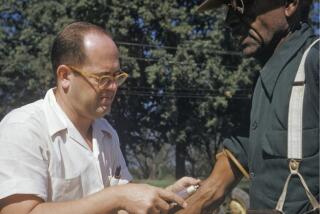People who feel wronged can really take it to heart
- Share via
If you think life is unfair, here is some disheartening news.
A new study found that people who thought they were treated unfairly were more likely to suffer a heart attack or chest pain. Those who thought they had experienced the worst injustice were 55% more likely to experience a coronary event than people who thought life was fair, according to the report published today in the Journal of Epidemiology and Community Health.
“Frequent experiences of unfair treatment can produce psychological distress that, in the long term, may influence health,” said lead author Roberto De Vogli, an epidemiologist at University College London.
The study, one of the largest and longest of its kind, examined medical data from 6,081 British civil servants. In the early 1990s, they were asked how strongly they agreed with this statement: “I often have the feeling that I am being treated unfairly.”
Unlike previous studies, the subjects were questioned before they showed any signs of cardiovascular disease. That way, the results weren’t skewed by people who thought life was unfair because they were already sick.
The subjects were tracked for an average of 10.9 years. In that time, 387 either died of a heart attack, were treated for a nonfatal attack or diagnosed with angina.
The researchers found that the rate of cardiac events among civil servants who reported low levels of unfair treatment was 28% higher than for those who had no complaints. People who reported moderate unfairness saw their risk rise by 36%.
Nancy Krieger, a professor at the Harvard School of Public Health, said the study added to a growing field of research linking poor cardiovascular and mental health to racial and gender discrimination -- two significant sources of unfair treatment.
People who think they are victims of discrimination often respond by drinking, smoking or overeating.
“They do things that take the edge off,” Krieger said. “If you do those things, those will have health consequences.”
Nadia Wager, a senior lecturer in psychology at Buckinghamshire Chilterns University College in Britain, said the unfairness question could be a helpful addition to routine medical checkups.
“If having to ask just one question can enable the doctor to ascertain risk, this would be extremely valuable,” she said.
The study was funded primarily by health agencies in the British and U.S. governments.







